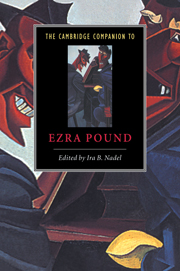Book contents
- Frontmatter
- 1 Introduction Understanding Pound
- 2 Pound and the making of modernism
- 3 Early poetry 1908-1920
- 4 Early Cantos I-XLI
- 5 Middle Cantos XLII-LXXI
- 6 Late Cantos LXXII-CXVII
- 7 Beyond The Cantos
- 8 The texts of The Cantos
- 9 Pound as critic
- 10 Pound as translator
- 11 Pound and the visual arts
- 12 Pound and music
- 13 Pound's politics and economics
- 14 Pound, women and gender
- 15 Pound and antisemitism
- Further reading
- Index
1 - Introduction Understanding Pound
Published online by Cambridge University Press: 28 May 2006
- Frontmatter
- 1 Introduction Understanding Pound
- 2 Pound and the making of modernism
- 3 Early poetry 1908-1920
- 4 Early Cantos I-XLI
- 5 Middle Cantos XLII-LXXI
- 6 Late Cantos LXXII-CXVII
- 7 Beyond The Cantos
- 8 The texts of The Cantos
- 9 Pound as critic
- 10 Pound as translator
- 11 Pound and the visual arts
- 12 Pound and music
- 13 Pound's politics and economics
- 14 Pound, women and gender
- 15 Pound and antisemitism
- Further reading
- Index
Summary
It is the artist's business to find his own virtu.
Pound, 1912Understanding Ezra Pound has never been easy. His erudition and experimentation, not to say his orneriness, have constantly challenged readers. His life as an expatriate in Venice, London, Paris and Rapallo clouded his identity as an American; the war years obscured it when he delivered a series of anti-American and antisemitic radio broadcasts supporting Mussolini. That led to his subsequent arrest, trial and imprisonment in a Washington, DC mental hospital. It also led to The Pisan Cantos, which won the prestigious Bollingen Prize in 1949. His release in 1958 saw him return to Italy where he died in 1972. Yet as he wrote in 1920, “I am terribly, appallingly, but I am not sure about the 'deplorably' American.” That for Pound did not change.
Literature, not politics, was his calling. As poet, translator, editor, critic, librettist, and dramatist, drawing on medieval, Italian, American, English, Chinese, French, and contemporary traditions, Pound created works that were as complex as they were absorbing. From 1915 until 1969 he worked on an ambitious epic poem, The Cantos, which embraced the multiple traditions that informed his work. Its part-publication over the years marked its constant re-creation as new influences and sources appeared. Before and during that effort, he produced a series of innovative lyric and dramatic poems that were alternately identified as Imagist or Vorticist but were undeniably modern.
- Type
- Chapter
- Information
- The Cambridge Companion to Ezra Pound , pp. 1 - 21Publisher: Cambridge University PressPrint publication year: 1999



